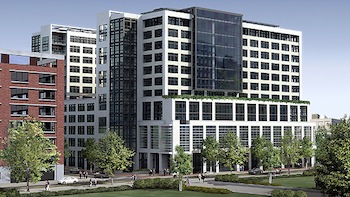Living Education


ONE of the hottest new amenities being offered in upscale urban condominium developments doesn’t have anything to do with granite in the kitchen, marble in the baths, steam rooms or simulator golf. It’s school.
The Hamilton Park Montessori School at the Hamilton Square condo in Jersey City.
As cities like Hoboken and Jersey City, once havens for college-age renters, have been transformed into condo-heavy communities brimming with young professionals, the population of babies and toddlers has inevitably increased.
“What typically happens,” said Eric Silverman, a principal of the Exeter Property Company in Jersey City, “is that single people move into our buildings, marry, have children and when the kids turn 2 or 3, they move to Montclair, Summit, Chatham or someplace in the suburbs where the schools are supposed to be great.”
Now, Mr. Silverman and other developers are striving to offer residents with children incentive to stay in their urban homes — by bringing high-quality schools right to their doorsteps.
Most of the schools being ensconced in large developments are private, but not all: in Hoboken, the developer Lawrence Bijou will build a 46,000-square-foot facility for the Elysian Charter School within a large residential building he plans to create in what is now a parking garage on Park Avenue. Charter schools are tax-supported but independently run.
Exeter is developing a 300-unit mixed-use condo community in Jersey City called Hamilton Square, fronting on Hamilton Park, on a site formerly occupied by St. Francis Hospital.
Part of the hospital complex has been demolished to permit construction of the first 126 loft-style units and ground-floor retail space. Sales are to open next month, at prices ranging from the $270,000s to $1.3 million, and hundreds of potential buyers have already added their names to a list at the project’s Web site, livingonthepark.com.
Even before construction began, two preschools were installed in the former nursing-school building of the hospital complex. “We really think schools are important to keep residents engaged in Jersey City,” Mr. Silverman said.
The Hamilton Park Montessori School has 46 students in two spacious classrooms on the second floor of a nursing-school building overlooking the two-acre park. There were more than 100 applicants for 20 spots that opened up last fall when the neighborhood school moved into its new site, said the director, Samantha Trice. Next year, a third classroom will open, and 29 more students will be accepted.
The Montessori school eventually plans to expand to prekindergarten through Grade 5, and it could then move to lease larger quarters in one of the new buildings to rise at Hamilton Square, Ms. Trice said.
Across a hallway from the Montessori school, the Garden Cooperative School, a parent-run nonprofit school now in its 12th year, caters to 3-, 4- and 5-year-olds in “the best space the school has ever had,” according to the board co-president, Shelley Skinner.
Both schools moved from cramped, dark basement spaces, and their administrators said they considered the accommodations at Hamilton Park “a gift,” although they do pay rent.
Meanwhile, developers of the Beacon, a condominium complex to rise at the site of a different former hospital in Jersey City, say they, too, are making plans for a school on the property.
Negotiations are under way with the 75-year-old Little Harbor Academy, a Roman Catholic-sponsored school, currently at a site on Marin Boulevard, that offers prekindergarten through eighth grade to children of any creed, said George Filopoulos, president of the Manhattan-based Metrovest Equities.
To create the Beacon, his company is renovating eight massive Art Deco structures that once made up the Jersey City Medical Center. It will have 1,200 condo and rental units, its own supermarket and shopping plaza, restaurants, a fitness center, stage and film theaters, and other amenities.
The school, Mr. Filopoulos said, will be designed with room to grow. “The school already has a waiting list downtown,” he said, “and we have a commitment that when they move here, applications from our residents will take priority.”
Mr. Filopoulos said the decision to provide a school was “part of the effort to make the residential units more desirable.”
Mr. Bijoux said it was members of the Hoboken school board who park their cars in his Park Avenue garage who first approached him. “My original reaction was that I didn’t think it sounded like the best idea,” said Mr. Mr. Bijou, whose main focus has been on creating “green” residential buildings in Hoboken.
But he later changed his mind. “After learning more about the Elysian school, the approach and the people associated with it, I realized it does make a lot of sense for Hoboken to have the school located here, where so many residences are being added,” he said.
Mr. Bijou is also renovating a nearby warehouse to become the Garden Street lofts. His two properties are adjacent to the two Hudson Tea residential buildings and a third structure that is being converted to lofts by Toll Brothers City Living.
“There is a real focus by the city administration in Hoboken to raise the level of education,” Mr. Bijou said, “and having this school locate here will benefit the overall community. Plus, it will help build a sense of community in a place that has become a new neighborhood in a very short period of time.”
Mr. Bijou said the school, which will occupy ground-level space in the building, will meet advanced “green” construction standards, and thus the building itself will be educational for its students.
Mr. Filopoulos went so far as to say schools within large developments might become a must-have. “As a developer, you can put in your best finishes, add more and more amenities, offer better views, lovely architecture,” he said. “But at the end of the day, you won’t be successful unless you provide the essential services that people find most important.”
Source: www.nytimes.com
